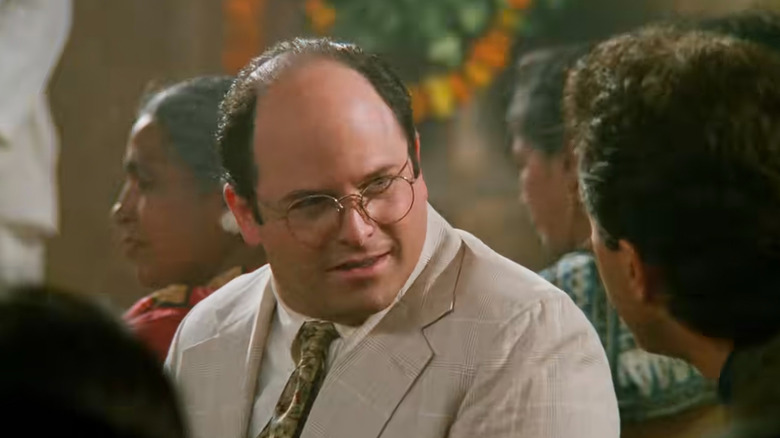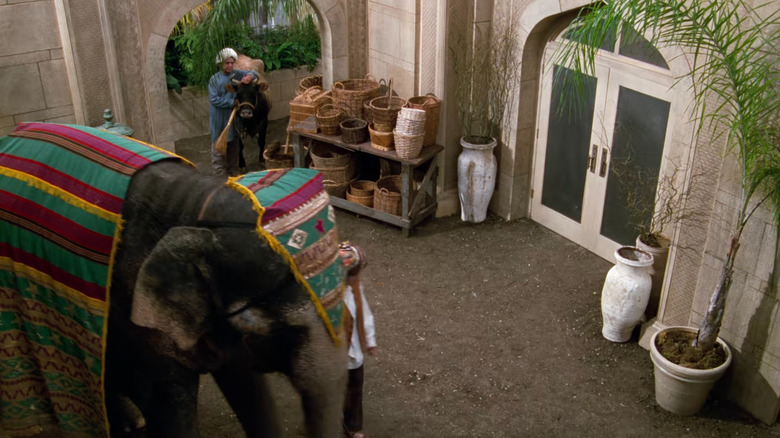An Expensive Seinfeld Gag Was Originally Pitched As A Joke
It helps for new television shows to hook an audience right out of the gate with their first season, but there are plenty of cases in which that inaugural period is needed to work out some kinks and find an identity. When it comes to NBC sitcoms, shows like "Parks and Recreation" and the American remake of "The Office" had a slow start, only to find its cultural footing in the following season. The same can be said for "Seinfeld," which has gone on to become one of the greatest sitcoms ever made.
Pitched as a show about how a comedian gets their material, series creators Larry David and Jerry Seinfeld only expanded the scope of this amount of comedic potential with each passing year. By the fourth season, "Seinfeld" was a prime water-cooler phenomenon that you simply had to be caught up on, with many of its jokes being introduced into the cultural lexicon. It didn't matter that characters like Jerry (Jerry Seinfeld), Elaine (Julia Louis-Dreyfus), George (Jason Alexander) and Kramer (Michael Richards) learned absolutely no lessons from their destructive actions. People just couldn't get enough of these walking manifestations of chaos. On top of that, "Seinfeld" would rarely hesitate to try something new, resulting in experimental episodes of television like "The Chinese Restaurant" or "The Limo." One episode, however, took things even further — or should I say, backwards.
In the series' ninth and final season, writers Peter Mehlman and David Mandel decided they wanted to pay homage to playwright Harold Pinter with their own comedic spin on his play "Betrayal." The stage show revolves around a near decade-spanning story about extramarital affairs between a group of friends, which is told in reverse chronological order. The "Seinfeld" adaptation does something similar, opening with the Castle Rock Entertainment logo and closing with the epicenter of the entire series, in which Jerry and Kramer first meet as neighbors. Among the key differences from play to parody is that, here, you get two adulterous stories for the price of one.
Jerry runs into an old girlfriend Nina (Justine Miceli), whom he introduces to George as a potential romantic prospect before sleeping with her behind his back. Elaine, meanwhile, gets invited to India for the wedding of her arch rival Sue Ellen Mischke (Brenda Strong), only to learn her fiance Pinter Ranawat (Shaun Toub) was a former lover of hers under a different name. Over the course of "The Betrayal," we witness how both stories intermingle with one another in the same backwards manner as the stage play — albeit in a much funnier capacity. "Seinfeld" was so popular that it could lean into these more experimental concepts without blinking an eye, so much so that it led to an expensive sight gag.
Seinfeld director Andy Ackerman got an elephant gag simply by asking for it
Given that a good portion of "The Betrayal" is supposed to take place in India, any extra bit of set decoration could help sell the illusion of the "Seinfeld" crew actually being there. Andy Ackerman, the episode's director, talks about how a half-hearted request he made to the network resulted in him getting exactly what he wanted – much to his surprise (via DVD featurette):
"We were in a position where we could kind of do whatever we wanted. Finance wasn't an issue. So I kind of half-jokingly asked [NBC] for an elephant and, apparently, they took me seriously."
The funny part about the whole request is that the elephant is only onscreen for less than ten seconds. It never comes back into the plot again, nor does it actually interact with the characters. It's simply used for two establishing shots in the first half of the episode. That's it. This kind of fruitless spending, especially for a half-hour sitcom, may seem like a bad idea monetarily, but there's something so hilarious about the show burning NBC's money simply because they could.
Even in its ninth season, "Seinfeld" was still a highly popular show for the network. Naturally, you want to keep them happy. Jerry was even offered a significant pay raise to move forward with a tenth season, but turned it down because it only would have been for the money. It's best to know when to call it quits when you've exhausted yourself creatively, and not push on because the money's still on the table. With that said, if the "Seinfeld" crew was able to get a massive elephant for a few seconds in their final batch of episodes, it's funny to think about what other expensive endeavors they could have gotten away with had they continued onward.
Every episode of "Seinfeld" is currently streaming on Netflix.

